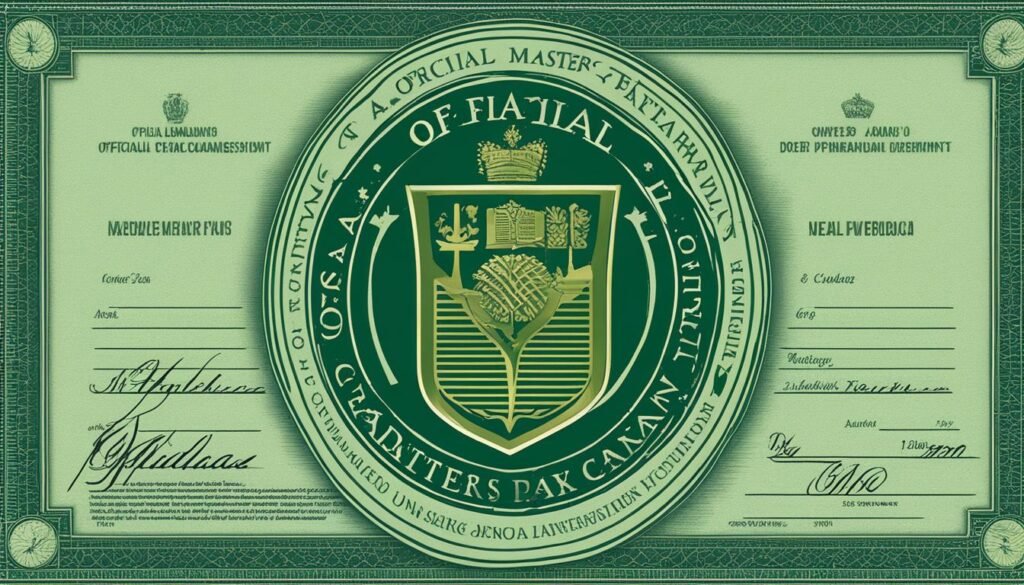Are you a Master’s graduate in Canada looking to explore post-graduation work opportunities? Understanding the process of obtaining a post-graduation work permit is essential for unlocking your potential and pursuing a successful career in Canada. In this article, we will guide you on where to find the necessary information regarding post-graduation work permits specifically tailored for Master’s graduates.
Key Takeaways:
- Post-graduation work permits are crucial for Master’s graduates in Canada to pursue career opportunities.
- Official information can be found on Canadian government websites, including the Immigration, Refugees and Citizenship Canada (IRCC) website.
- Designated learning institutions offer programs that make international students eligible for post-graduation work permits.
- The application process involves submitting various documents and following the instructions provided.
- Post-graduation work permits open up various work opportunities and can be a pathway to permanent residency in Canada.
Understanding Post-Graduation Work Permits
Post-graduation work permits play a vital role for international students who have completed their program of study in Canada. These permits are issued by the Canadian government and offer an opportunity to kickstart your career in Canada after completing your studies. Let’s delve into the key aspects of post-graduation work permits, including eligibility criteria and duration.
Eligibility Criteria
To be eligible for a post-graduation work permit, you must meet certain criteria set by the Canadian government. Firstly, you should hold a valid study permit throughout your program. Additionally, you need to graduate from a designated learning institution in Canada. These institutions are approved by the government and include universities, colleges, and other educational establishments. Lastly, it is important to apply for the work permit within a specific timeframe after your graduation.
Duration of Work Permit
The duration of the post-graduation work permit depends on the length of the program you have completed. If your program was less than two years, you may be eligible for a work permit that is valid for the same length as your program. On the other hand, if your program was two years or longer, you may be eligible for a work permit that is valid for up to three years. This allows you to gain valuable work experience and explore career opportunities in Canada.
Now that you understand the underlying principles of post-graduation work permits and their eligibility criteria, let’s uncover where to find official information regarding these permits in the next section.
Where to Find Official Information

When it comes to obtaining official information about post-graduation work permits for Master’s graduates in Canada, the most reliable and up-to-date source is the Canadian government websites. Specifically, the Immigration, Refugees and Citizenship Canada (IRCC) website provides comprehensive details regarding eligibility requirements, the application process, and other important information pertaining to post-graduation work permits. By referring to this official government website, you can ensure that you are accessing accurate and authoritative information.
In addition to the IRCC website, it is also beneficial to explore the websites of designated learning institutions and provincial immigration authorities. These websites often contain valuable resources specific to their respective regions. By visiting these official sources, you can gain insights tailored to your educational institution and province, enabling you to make well-informed decisions regarding your post-graduation work permit.
By relying on official information from Canadian government websites, you can navigate the process of obtaining a post-graduation work permit with confidence and peace of mind.
Designated Learning Institutions in Canada
When pursuing your Master’s program in Canada, it is essential to choose a designated learning institution (DLI) that has been approved by the government. In order to be eligible for post-graduation work permits, you need to enroll in a program of study offered by a recognized institution.
These designated learning institutions include universities, colleges, and other educational establishments. They have met the required standards set by the government, ensuring that the education you receive is of high quality and recognized by Canadian employers.
By selecting a DLI for your Master’s program, you can unlock the potential to work in Canada after graduation. It is important to research and choose an institution that offers programs relevant to your field of study and aligns with your career goals.
Attending a DLI not only makes you eligible for post-graduation work permits but also enhances your educational experience. These institutions often have state-of-the-art facilities, experienced faculty, and extensive networks that can provide you with valuable opportunities for research, internships, and networking.
Choosing a recognized DLI sets you on the path to success by opening doors for career opportunities in Canada. Ensure that the institution you select is listed as a designated learning institution on the official Canadian government website to guarantee your eligibility for post-graduation work permits.
Applying for a Post-Graduation Work Permit

Now that you understand the eligibility criteria and benefits of a post-graduation work permit, it’s time to explore the application process. Applying for a post-graduation work permit is a straightforward process that requires you to submit several documents to the Canadian government.
To apply for a post-graduation work permit, you will need:
- Proof of graduation from a designated learning institution
- A valid passport
- A completed application form
These documents are essential to prove your eligibility for the work permit. It is crucial to carefully follow the instructions provided by the Canadian government to ensure a successful application.
You have two options to submit your application: online or by mail. If you choose to apply online, you can do so through the official website of Immigration, Refugees and Citizenship Canada (IRCC). Make sure you fill out all the required fields accurately and attach the necessary documents in the specified format.
If you prefer to submit your application by mail, you can download the application form from the IRCC website and send it to the designated mailing address along with the supporting documents. It is important to note that there is a fee associated with the application, which can be paid online or through a certified check or money order.
Once your application is submitted, it will be processed by the Canadian government, and you will be notified of the outcome. The processing time may vary, so it is advisable to submit your application well in advance to ensure a smooth transition from graduation to post-graduation work permit holder.
Remember, in order to have the best chance of success, carefully gather all required documents, double-check your application for accuracy, and adhere to the instructions provided by the Canadian government. This way, you can maximize your chances of obtaining a post-graduation work permit and kickstart your career in Canada.
Duration of Post-Graduation Work Permits
The duration of post-graduation work permits for Master’s graduates in Canada varies depending on the length of the program completed. If you have completed a program that is less than two years in duration, you are eligible for a work permit that is valid for the same length as your program.
On the other hand, if you have completed a program that is two years or longer, you may be eligible for a work permit that is valid for up to three years. This extended duration allows you ample time to gain valuable work experience and explore career opportunities in Canada.
Obtaining a post-graduation work permit with a longer duration can provide you with valuable stability as you navigate the Canadian job market and potentially apply for permanent residency in the future.
By taking advantage of the post-graduation work permit program, you can maximize your post-graduate experience and lay a strong foundation for your career in Canada. The duration of your work permit will allow you to gain valuable skills, build your professional network, and explore potential pathways to permanent residency.
Work Opportunities for Post-Graduation Work Permit Holders

Holding a post-graduation work permit opens up a world of work opportunities for Master’s graduates in Canada. As a post-graduation work permit holder, you have the freedom to work for any employer, in any occupation, and are not restricted to a specific location. This allows you to explore your field of study and gain valuable work experience in a variety of industries across Canada.
Whether your passion lies in technology, finance, healthcare, or any other field, you have the flexibility to pursue work opportunities that align with your career goals. The post-graduation work permit gives you the chance to apply the knowledge and skills you acquired during your Master’s program in a practical work setting, while also expanding your professional network.
Furthermore, being a post-graduation work permit holder can potentially open doors to permanent residency in Canada. The work experience gained during your time as a permit holder can contribute to the eligibility requirements for various immigration programs, such as the Canadian Experience Class and the Provincial Nominee Program. These programs offer pathways to gaining permanent residency, allowing you to build a future in Canada.
- Gain valuable work experience in your field of study
- Explore different industries and job roles in Canada
- Expand your professional network
- Potentially secure permanent residency through immigration pathways
Benefits of Work Opportunities for Post-Graduation Work Permit Holders:
By making the most of the work opportunities available as a post-graduation work permit holder, you can enhance your professional growth and set yourself up for long-term success in Canada. Take advantage of the diverse range of industries, job prospects, and the chance to contribute to the Canadian workforce.
Extending or Changing the Work Permit
Once you have obtained your post-graduation work permit, it’s important to be aware of the options available to you for extending or changing your permit. These processes allow you to continue working in Canada and explore new opportunities that align with your career goals. Whether you want to extend your current work permit or change it to reflect a different field or occupation, there are steps you can take to make it possible.
Extending Your Work Permit
If you wish to continue working in Canada after your initial work permit expires, you can apply for an extension. To be eligible for an extension, you must meet certain criteria, including maintaining valid status as a temporary resident, complying with the conditions of your current work permit, and having a job offer from a Canadian employer. Extending your work permit allows you to continue contributing to the Canadian workforce, gaining valuable experience, and potentially opening doors to permanent residency opportunities.
Changing Your Work Permit
Graduates who find employment in a different field or occupation may have the option to change their work permit to reflect the new job. This provides flexibility and opportunities to pursue different career paths in Canada. To change your work permit, you must meet specific eligibility requirements, including having a valid job offer in the new occupation and meeting the requirements of the new work permit category. Changing your work permit enables you to explore diverse industries and gain valuable skills in different professional domains.
Whether you choose to extend your work permit or opt for a change, it is crucial to understand the eligibility criteria and requirements for each process. Ensuring that you meet the necessary criteria and providing all the required documentation will increase your chances of a successful application. Stay informed about the application deadlines and submission procedures outlined by the Canadian government to avoid any complications in the process.
By extending or changing your work permit, you can continue your professional journey in Canada as a Master’s graduate, taking advantage of the opportunities available to you. Embrace the possibility of growth, skill development, and the potential for long-term career prospects in your desired field. Keep in mind that each situation is unique, and seeking advice from immigration professionals or authorities can provide additional guidance tailored to your circumstances.
Resources for Immigration Support
Get the Assistance You Need for a Smooth Immigration Process
As a Master’s graduate in Canada, you have access to a range of resources that can provide valuable immigration support. These resources are designed to guide and assist you throughout the complex immigration process, ensuring you have the information and guidance you need to make informed decisions.
Here are some key resources available to help you:
- Immigration Consulting Firms: These firms specialize in providing expert advice and assistance with immigration processes. They can help you navigate the requirements, prepare your application, and address any concerns or challenges that may arise.
- Non-Profit Organizations: There are various non-profit organizations dedicated to supporting immigrants in Canada. These organizations offer a range of services, including access to workshops, informational resources, and guidance on immigration pathways.
- Government-Funded Services: The Canadian government provides resources and services to support immigrants in their journey. This includes online portals, information hotlines, and local immigration offices that can provide guidance and answer your questions.
By leveraging these resources, you can ensure a smooth and successful transition as you navigate the immigration process. They can provide you with the necessary information, advice, and support to help you make informed decisions and take the next steps towards your career goals in Canada.
Benefits of Post-Graduation Work Permits for Master’s Graduates
Post-graduation work permits offer numerous benefits to Master’s graduates in Canada. They provide an opportunity to gain valuable work experience, earn a competitive salary, and potentially qualify for permanent residency in Canada. With a post-graduation work permit, you can:
- Gain valuable work experience: Work permits allow you to apply the knowledge and skills you acquired during your Master’s program in a practical work setting. This hands-on experience can enhance your professional development and make you more desirable to future employers.
- Earn a competitive salary: Working in Canada after completing your Master’s degree can provide you with a competitive salary and financial stability. You’ll have the opportunity to build your career and establish a strong foundation for your future.
- Potentially qualify for permanent residency: Post-graduation work permits can be a pathway to permanent residency in Canada. The work experience gained during the validity of your work permit can contribute to the eligibility requirements for various immigration programs.
By taking advantage of the benefits offered by post-graduation work permits, you can optimize your career prospects and increase your chances of long-term success in Canada.
Transitioning to Permanent Residency

For Master’s graduates in Canada, post-graduation work permits offer a potential pathway to permanent residency. The work experience gained during the validity of the work permit can be a valuable asset in meeting the eligibility requirements for various immigration programs. Two key programs to consider are:
1. Canadian Experience Class (CEC)
The CEC is designed for individuals who have gained skilled work experience in Canada. By leveraging the work experience acquired during their post-graduation work permit, Master’s graduates can enhance their eligibility for the CEC. This program provides a smooth immigration pathway, allowing you to continue building your career in Canada and contributing to the country’s economy.
2. Provincial Nominee Program (PNP)
The PNP enables specific provinces and territories in Canada to nominate individuals who possess the skills and experience needed to contribute to the local economy. Many provinces have streams that specifically target international students who have completed their studies in the province. With your post-graduation work permit experience, you may be eligible to apply for a provincial nomination through the PNP, which can lead to permanent residency in that particular province.
It is important to thoroughly research and understand the requirements of each program, as they may vary depending on the province and specific immigration stream. By familiarizing yourself with the available options, you can make informed decisions and take the necessary steps to transition from a temporary work permit to permanent residency in Canada.
Conclusion
Post-graduation work permits present a valuable opportunity for Master’s graduates in Canada to launch their careers and pursue permanent residency. By familiarizing themselves with the eligibility criteria, application process, and available resources, graduates can make informed decisions and make the most out of their post-graduation work permit experience. Staying updated on immigration policies and regulations is crucial to ensure a seamless transition from student to working professional in Canada.
Obtaining a post-graduation work permit allows Master’s graduates to gain practical work experience, earn a competitive salary, and apply their acquired knowledge and skills. These work permits also open doors to various work opportunities, as permit holders are not restricted to a specific location or employer in Canada. Furthermore, the experience gained during the work permit can contribute to the eligibility requirements for permanent residency through immigration programs like the Canadian Experience Class or the Provincial Nominee Program.
It is essential for Master’s graduates to leverage the resources available to them, such as immigration consulting firms, non-profit organizations, and government-funded services that provide guidance and assistance throughout the immigration process. By staying proactive and well-informed, graduates can navigate the complexities of the post-graduation work permit system and maximize their chances of building a successful career and future in Canada.
Source Links
- https://www.legit.ng/people/1573236-futo-computer-science-graduate-achieved-class-breaks-silence/
- https://www.newsfromthestates.com/article/iowa-public-universities-welcome-more-international-students-enrollment-increases-across-us
- https://opportunitiesandcareers.com/2024/01/12/human-resources-intern/


